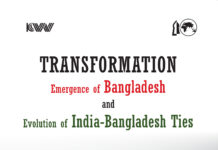by F R Chowdhury
In the United Kingdom the last Labour Government had come to power led by Tony Blair through a massive victory in general election in 1997. Tony Blair was hugely popular initially but lost most of his support after joining hands with United States to invade Iraq on false pretext of hidden nuclear or other chemical weapons. He eventually resigned in 2007 when Gordon Brown took over as Prime Minister. The Labour Party lost the general election in 2010 when Conservative Party and Liberal Democratic Party formed a coalition government.
During the 13 years of Labour Government there was one Mr. David Blunkett who served as a cabinet member under both prime ministers heading a number of departments at different times. He was Home Secretary from 08-June-2001 to 15-December-2004. He was a blind person who used to move around with his guide dog. He was a very knowledgeable and efficient minister who never showed any sign of any disability or incapacity.
Mr. Blunkett had a Filipina domestic aid. However, this maid was always busy running around the Home Office to fix her visa/ residential status. Whenever Mr. Blunkett asked for her, she was away to Home Office. The minister got quite upset. One morning after coming to office, the minister asked his Private Secretary to ring up the Director of Immigration to find out the problem relating to the status of his maid. In a few minutes his secretary told him that the problems had been solved. The minister looked happy.
The happiness of the minister did not last long. Within next two days he faced questions in the parliament. He was accused of over-exercising in other words misusing his powers. He replied that he merely wanted to know the status of the case and nothing more. The member of the parliament reminded the minister as to what it implies to a director when the minister wants to know the status. That was enough. Mr. David Blunkett resigned as the Home Secretary.
The obvious question that will come to the mind of a reader is that after all minister is the person overall in-charge of the entire ministry and as such he could even ask for the matter to be settled as per his wishes. When I talked to a Spanish friend of mine about this matter, his views were also similar. The minister could take a decision and ask the director to act accordingly. I cannot blame their understanding. After-all Spain was under military dictatorship for a long time. Democracy will take time to establish its ethics, standards and tradition.
In the United Kingdom it is different. Civil servants carry out all day to day operational work in accordance with rules, procedures and guidelines given by the government/ ministers. The ministers do not interfere with delegated functions. Ministers oversee the work done by civil servants (on behalf of the government). The minister can ask for explanations of the relevant civil servant when s/he feels there has been violation of procedures that compromises policy of the government. This is because at the end of the day the minister remains answerable to the parliament. What the minister cannot do is to dictate the civil servant what to do or how to do. That would amount to interfering with functions delegated to civil servants. This would also mean misuse of power. At the same time the civil servants are also intelligent and matured enough to understand when to refer to the minister a case that may have political implications. These matters are set out by practice and procedures. Mr. Blunkett acted beyond his usual call of duty when he asked his private secretary to ring up the director of immigration in respect of a particular case. That was not acceptable to the tradition of British democratic governance and he had to go. In the process it set up a bench mark of standards and a precedent for future reference. This is how the democratic governance works in Britain that has no written constitution.
In developing countries, most of which were under colonial rule for long period of time, the relation between government/ ministers and civil servants is not well defined or understood. Lack of documented procedures and government guidelines are to blame. This is a big obstacle for democratic governance. It becomes a serious problem when the ministers are corrupt. They try to get the civil servants also involved in their corrupt practice and procedures. The ministers even pass un-written orders and instructions. In most cases the civil servants are not bold enough to take a stand. The civil servants also remain afraid of losing their jobs. This is how state machineries are used for party political gains.
The idea behind this article is that there should be rules-regulations and documented procedures in addition to governmental policy guidelines for conducting routine operational duties by the civil servants on behalf of the Government. The minister must ensure that every decision is arrived at in full compliance of the procedures. After all it is the minister who is answerable to the parliament. It must not be necessary for everything to be referred to the ministers which drastically reduce efficiency. The civil servants should be trained and efficient enough to discharge the delegated functions. This delicate balance should be maintained. That is the true spirit of democratic governance.
London 15-November-2014 fazlu.chowdhury@btinternet.com









